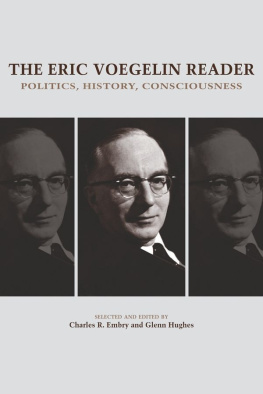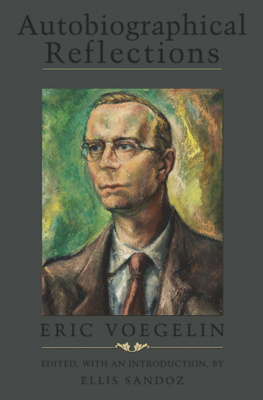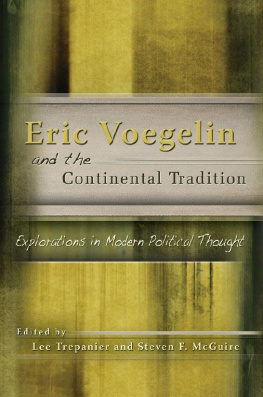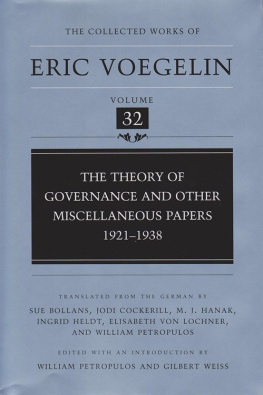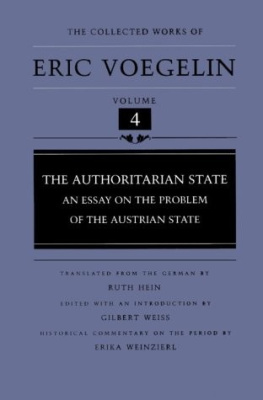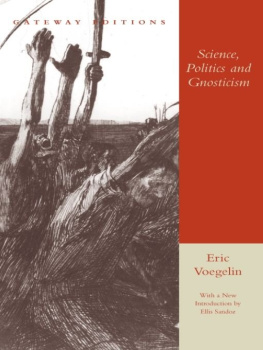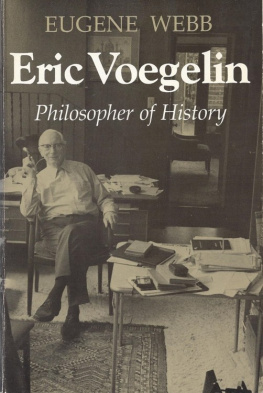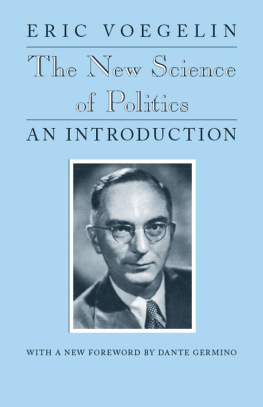Charles R. Embry - The Eric Voegelin Reader
Here you can read online Charles R. Embry - The Eric Voegelin Reader full text of the book (entire story) in english for free. Download pdf and epub, get meaning, cover and reviews about this ebook. year: 2017, publisher: University of Missouri Press, genre: Science / Politics. Description of the work, (preface) as well as reviews are available. Best literature library LitArk.com created for fans of good reading and offers a wide selection of genres:
Romance novel
Science fiction
Adventure
Detective
Science
History
Home and family
Prose
Art
Politics
Computer
Non-fiction
Religion
Business
Children
Humor
Choose a favorite category and find really read worthwhile books. Enjoy immersion in the world of imagination, feel the emotions of the characters or learn something new for yourself, make an fascinating discovery.
- Book:The Eric Voegelin Reader
- Author:
- Publisher:University of Missouri Press
- Genre:
- Year:2017
- Rating:3 / 5
- Favourites:Add to favourites
- Your mark:
- 60
- 1
- 2
- 3
- 4
- 5
The Eric Voegelin Reader: summary, description and annotation
We offer to read an annotation, description, summary or preface (depends on what the author of the book "The Eric Voegelin Reader" wrote himself). If you haven't found the necessary information about the book — write in the comments, we will try to find it.
The Eric Voegelin Reader — read online for free the complete book (whole text) full work
Below is the text of the book, divided by pages. System saving the place of the last page read, allows you to conveniently read the book "The Eric Voegelin Reader" online for free, without having to search again every time where you left off. Put a bookmark, and you can go to the page where you finished reading at any time.
Font size:
Interval:
Bookmark:

POLITICS, HISTORY, CONSCIOUSNESS
SELECTED AND EDITED BY
Charles R. Embry and Glenn Hughes
UNIVERSITY OF MISSOURI PRESS
COLUMBIA
Copyright 2017 by
The Curators of the University of Missouri
University of Missouri Press, Columbia, Missouri 65211
Printed and bound in the United States of America
All rights reserved. First printing, 2017
ISBN: 978-0-8262-2134-6
Library of Congress Control Number: 2017941095
 This paper meets the requirements of the American National Standard for Permanence of Paper for Printed Library Materials, Z39.48, 1984.
This paper meets the requirements of the American National Standard for Permanence of Paper for Printed Library Materials, Z39.48, 1984.
Typeface: Trump Mediaeval
ISBN-13: 978-0-8262-7390-1 (electronic)
To:
Beverly Jarrett
and
The Editorial Board of
THE COLLECTED WORKS OF ERIC VOEGELIN
Paul Caringella
Jrgen Gebhardt
Ellis Sandoz
In Memoriam Thomas Hollweck
ERIC VOEGELIN WAS one of the most creative and prolific philosophers of the twentieth century. Up to the present, however, he is only sparsely celebrated as such. There are various reasons for this relative lack of recognition. First, his mature philosophical writings, besides being challenging in their depth and complexity, are also unconventional, not fitting into any of the contemporary philosophical schools. Second, he is most typically identified as a political scientistunderstandably, as his writing and teaching career began and developed in the context of his concern with political and legal theory. And while those who familiarize themselves with the philosophical broadening in his mid-period work tend to describe him as a political philosopher, even this label doesnt prepare us for what we find in Voegelins corpus taken as a whole. For in its full, magisterial scope, it constitutes nothing less than a critical analysis and assessment of the entire political, religious, and philosophical heritage of the West with regard to essential discoveries and decisive transformations. Also, in responding to the specific challenges of modernity, his mature thought entails the working out of a large-scale philosophy of history, together with a detailed philosophical anthropology upon which to found it. Consequently it is as a major, and unusually expansive, philosopher of existence and history that Voegelin should primarily be regardedand as he is here presented.
Still, the realm of the political, understood in its broadest sense, remains always at the center of Voegelins philosophical project, since his focus never strays far from the fundamental question that lay at the heart of Socratess questing activity and drives Platosdialogues: On what basis should we order our lives in society? In striking contrast to many political philosophers, however, Voegelin came to hold that, in order to approach a satisfactory contemporary answer to that question, nothing less was required than an analysis and diagnostic appraisal of all of the most influential ideas and imagesor, as he puts it, symbolswith which Western cultures have understood, and tried to shape, personal and political order. Consequently we find the enormous scope of material addressed in the thirty-four volumes of his Collected Works.
Voegelins genesis and development as a philosopher was as non-typical as the scope and character of his philosophical accomplishment. These may be portrayed by way of, first, a brief intellectual biography, and second, a description of key elements of his philosophy, culminating in remarks concerning Voegelins understanding of the meaning of the term philosophy, his recognition of the necessarily incomplete nature of any genuine philosophical enterprise, and his view of the link between the biographical development of a philosopher and the quality of the philosophy produced.
Intellectual Biography
Born in Cologne, Germany, on January 3, 1901, and educated in Vienna from 1910, Voegelin earned his doctorate in a political science program under the Faculty of Law at the University of Vienna in 1922. He taught political science and sociology as a member of the law faculty there between 1929 and 1938, serving that faculty also as an assistant for constitutional and administrative law. Between 1924 and 1926 he spent two years in the United States on Rockefeller Foundation fellowships, where he attended lectures at Harvard, Columbia, and the University of Wisconsin, and subsequently spent a year in France again supported by a Rockefeller fellowship. Out of his studies of Anglo-American legal and philosophical traditions came his first book (1928), ber die Form des amerikanischen Geistes (On the Form of the American Mind). The increasing tensions on the European political stage and the rise of National Socialism led Voegelin to the focus of his next two books, both appearing in 1933: Rasse und Staat (Race and State) and Der Rassenidee in der Geistesgeschichte (History of the Race Idea). Together they offered a scholarly critique of the biological theoriesunderlying Nazi race doctrines and their origins. His last two books published before emigrating to the United States, Der autoritre Staat (The Authoritarian State) of 1936 and Die politischen Religionen (The Political Religions) of 1938, reflect Voegelins efforts to understand the rising influence of ideological fanaticisms in his political milieu, and his recognition that they involve substituting world-immanent objects, such as the race or the nation, for divine reality. Not surprisingly, these last four books brought him unflatteringly to the attention of the Nazis, and when Hitler annexed Austria in 1938 Voegelin had to flee for his life. His close escape from the Gestapo, into Switzerland and finally to the United States, along with his wife Lissy Onken Voegelin, allowed him to continue to devote himself, in his new surroundings, to the study of political disorder in general and especially of the origins of the twentieth-century European calamity.
After brief appointments at Harvard, Bennington, Northwestern, and Alabama, Voegelin settled into an associate professorship in the Department of Government at Louisiana State University, where he and Lissy embraced their adopted homeland with gusto, becoming American citizens in 1944. He soon began publishing primarily in English. Voegelin first gained widespread attention as a political philosopher with a book written in English, The New Science of Politics (1952), an expansion of the Charles Walgreen Lectures he gave at the University of Chicago in 1951. This work, in which Voegelin introduces a philosophy of politics and history answerable to the full trajectory of Western civilization, may be read as a prcis for his multi-volume magnum opus, Order and History (195687). It begins the large-scale working through of Voegelins attempt to analyze the sources and fundamental problems of social and political order, and to find an approach to the understanding of political phenomena more comprehensive and convincing than those found in current philosophies and social science methodologiesan approach that could equally diagnose the disease of contemporary totalitarian movements, and also explain their rise in terms of an intelligible, genetic development in the history of thought in the West.
Prior to these efforts, however, Voegelin had worked for years in the 1940s on a projected History of Political Ideas, which began as a commissioned textbook, but eventually burgeoned into a studyof over 4,000 manuscript pages (making up eight volumes of the
Font size:
Interval:
Bookmark:
Similar books «The Eric Voegelin Reader»
Look at similar books to The Eric Voegelin Reader. We have selected literature similar in name and meaning in the hope of providing readers with more options to find new, interesting, not yet read works.
Discussion, reviews of the book The Eric Voegelin Reader and just readers' own opinions. Leave your comments, write what you think about the work, its meaning or the main characters. Specify what exactly you liked and what you didn't like, and why you think so.

